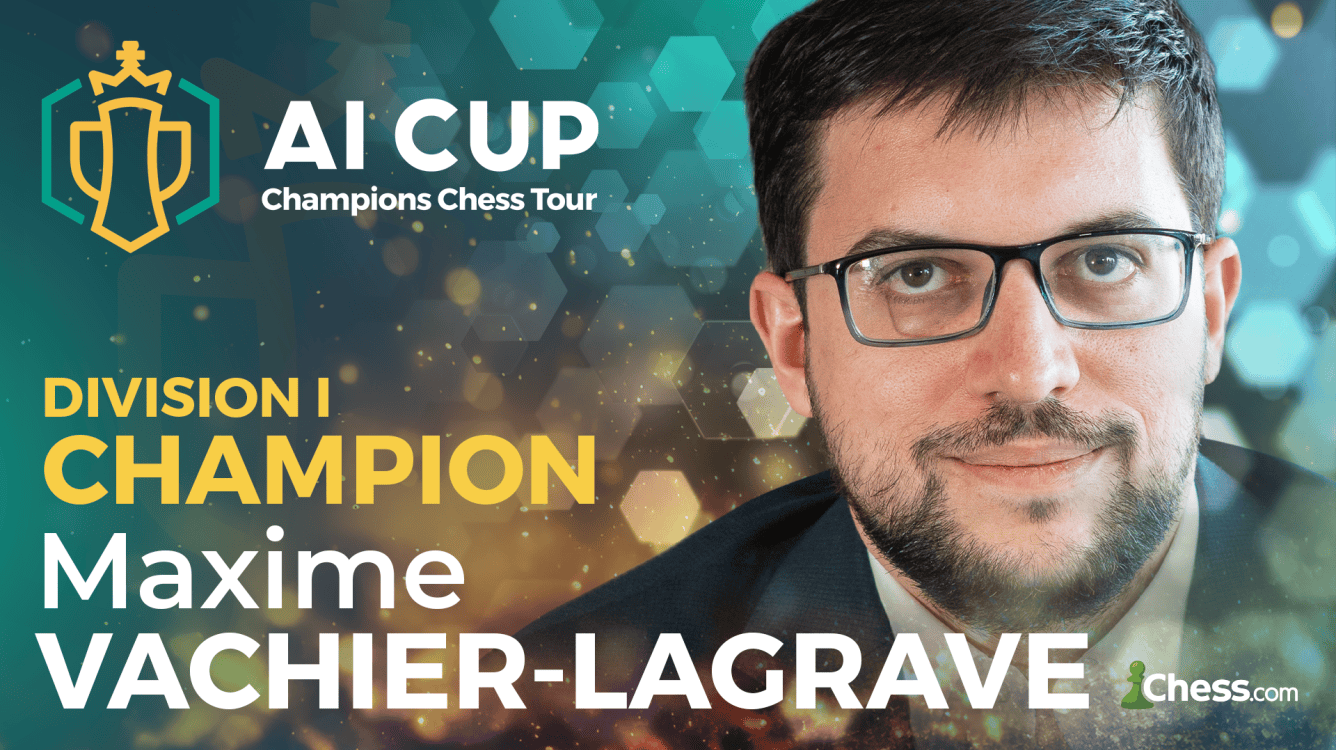
Vachier-Lagrave Beats Carlsen Twice To Win AI Cup, Qualify For Toronto
GM Maxime Vachier-Lagrave has pulled off the mission impossible of beating world number-one Magnus Carlsen, not in just one match but two, to win the 2023 AI Cup and qualify for the Champions Chess Tour Finals in Toronto. "Maxime was strong and I failed at the critical moments," said Carlsen, after failing to win a game while Vachier-Lagrave won three.
That meant heartbreak for GM Vladimir Fedoseev, whose victory over GM Vladislav Artemiev in the Division II Grand Final would have meant a spot in Toronto if not for Vachier-Lagrave's heroics.
GM Sam Sevian ended the season with the extraordinary feat of winning Division III three times, after also winning two matches against GM Rauf Mamedov.
The final day of the AI Cup meant the Grand Final in all three divisions.
Division I
To win the AI Cup, Vachier-Lagrave knew that he would first have to beat Carlsen in a four-game match, and then again in a two-game "reset." It was a mountain to climb, but climb it he did!
Feel good Inc. 🎶 https://t.co/yOMYj2wzKY
— MVL (@Vachier_Lagrave) September 29, 2023
"A journey of a thousand miles begins with a single step," a Chinese proverb runs, and for the French grandmaster that step was an extraordinary win in the first game of the first match.
Grand Final: Vachier-Lagrave 2.5-1.5 Carlsen
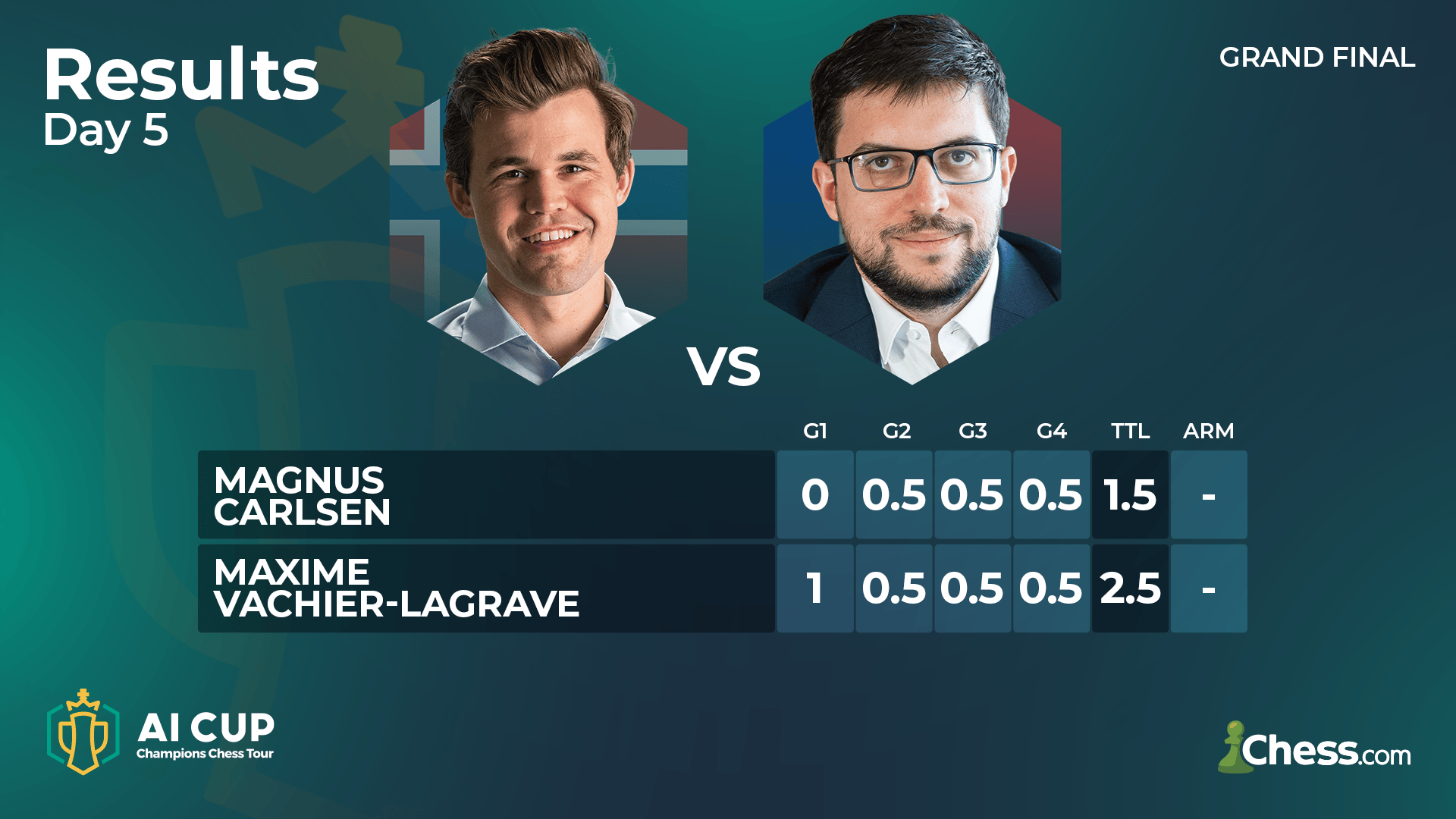
One of the questions going into the day was whether we would see a repeat of the phenomenally hard-fought and accurate play we'd seen from the same two players in their match two days earlier, when Carlsen had scraped home as the winner with a draw in the final sudden-death game. The answer was yes and no.
The first moves highlighted one difference, since after four Sicilians in that match, Carlsen opened 1.d4, and then Vachier-Lagrave went for the Queen's Gambit Accepted with 1...d5 2.c4 dxc4.
Any expectation of quieter games was dispelled when the Frenchman went for one of his typical pawn sacrifices for activity early in the middlegame, and he was making Carlsen burn up time to preserve a nominal advantage. By the time we reached the endgame, however, a draw looked inevitable, and only the five-time world champion could be better.
Queens have just been exchanged, and if here Carlsen had put his bishop on e5 it's inconceivable that he could have lost with his extra pawn. Instead, however, he went for 28.Bd6?!, allowing Vachier-Lagrave to capture the knight and then the pawn on d4. Carlsen must have held out some hopes for his b-pawn, but instead things went from bad to worse as he soon dropped another pawn.
"I think he's lost his head here!" (Howell)
— chess24.com (@chess24com) September 29, 2023
Magnus gives up a second pawn and is losing the endgame to MVL!#ChessChamps #AICup pic.twitter.com/inP31CFAse
Maxime later had a sober assessment of the first match: "I think I was quite dominated throughout, but I got this lucky break in game one where he over-pushed and then gave up this pawn on f2, thinking probably that he was forcing a draw, but actually he wasn’t."
Carlsen didn't get another chance and found himself having to resign.
It was already clear that Carlsen wasn't at the top of his game, but then neither was Vachier-Lagrave. He commented:
Today I feel like I played a bit worse actually, but Magnus as well was quite tired. I don’t know about the quality of the moves, but at least I was missing a lot of ideas for Magnus, and Magnus was also missing a lot of ideas for me. That was not happening two days ago.
The Frenchman also shared his secret to preserving his lead:
Somehow this mix of solidity and finding practical resources to get counterplay, this obviously is one of the things I’m very good at, at least I consider myself to be very good at. I did manage this today. There’s something I feel I didn’t manage too well today—my calculation was a bit shaky, but overall it’s kind of normal. I was feeling tired already from the start of the day and throughout it got worse.
That ability to find resources came in handy in the second game of the day, when Carlsen threatened to take over on the black side of a quiet Berlin Defense before Vachier-Lagrave's counterplay ensured a draw.
Game three, however, was where the former world champion missed a huge chance to hit back. He'd had time to refresh his memory of some sharper replies to the Queen's Gambit Accepted and struck early in the center. Vachier-Lagrave reacted badly and, after some twists and turns, found himself completely lost.
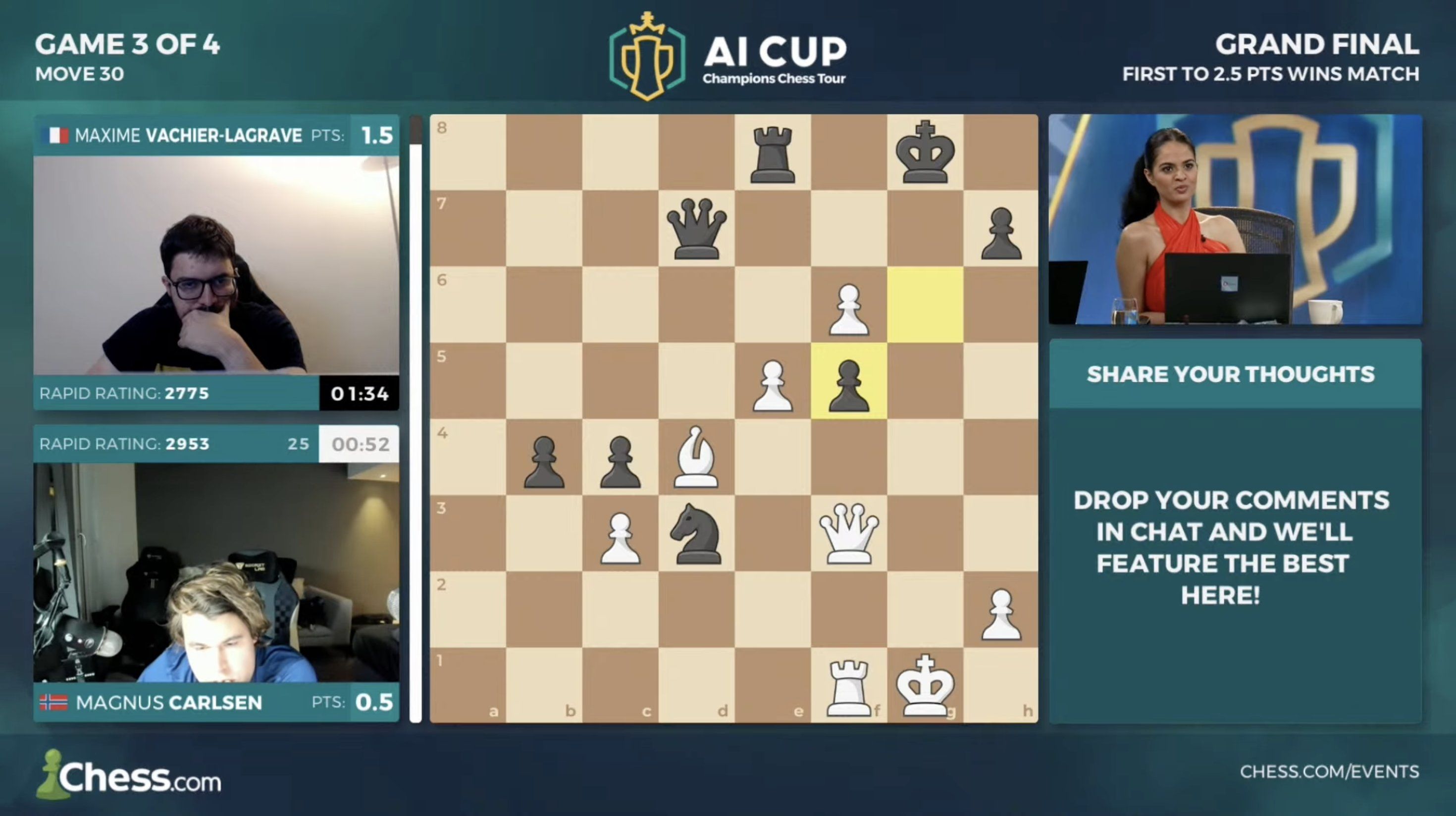
Time was low, but if Carlsen had kept queens on the board, he would have had a huge advantage. Instead, he took on f5 with his queen, going for an endgame. Suddenly the winning margin grew narrow, and soon Black found a way to defend and escape with a draw.
Carlsen had such episodes on his mind when he summed up later: "I’m disappointed obviously. I was hoping to do quite a bit better today, but Maxime was strong and I failed at the critical moments, so that’s I think a fair outcome."
That meant Carlsen had to win the final game on demand with the black pieces to take the match to armageddon. He switched to the Caro-Kann, but this time nothing went his way, and in fact, Vachier-Lagrave got to launch a kingside attack.
Howell: "What!? Magnus Carlsen is just calling the bluff, he's just ignoring the safety of Black's king. How can he get away with this?"
— chess24.com (@chess24com) September 29, 2023
Tania: "But it's not a bluff, right?" #AICup #ChessChamps pic.twitter.com/H6X77kpaKQ
Soon all Carlsen could do was save the game with a draw by perpetual check, but that was fine by Vachier-Lagrave, since it meant he'd won the first match and forced a Grand Final "reset." He managed to retain his momentum in the second, decisive match.
Grand Final Reset: Vachier-Lagrave 2-0 Magnus Carlsen
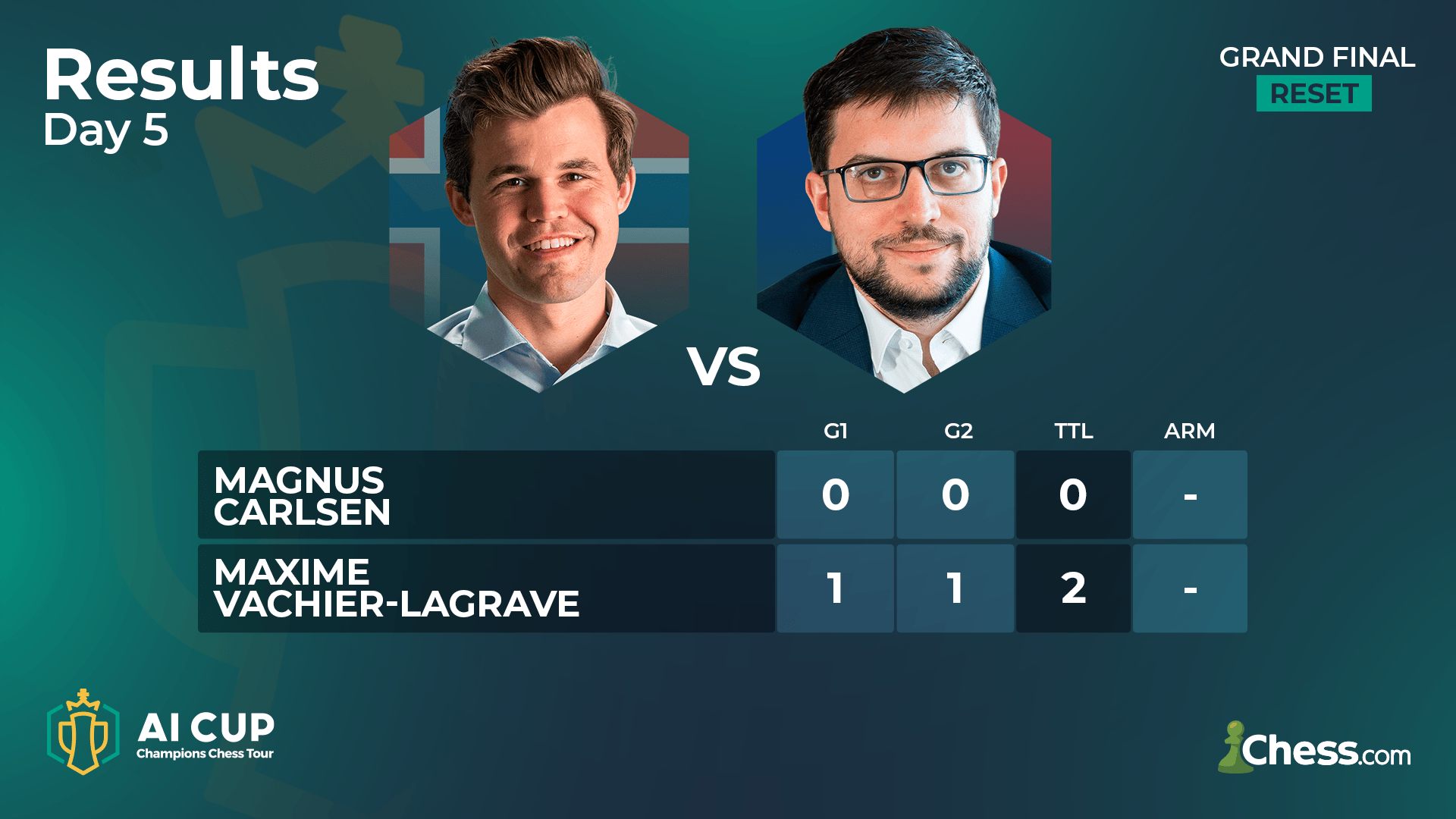
The key game was again the first, when Carlsen unleashed an extraordinary queen sacrifice.
«This is deep opening preparation!» @DavidHowellGM
— Champions Chess Tour (@ChampChessTour) September 29, 2023
Magnus sacrifices his queen in the opening 😮 pic.twitter.com/6j274cwQBL
Vachier-Lagrave said he'd checked this "very briefly," and though he blitzed out his moves he forgot a final touch. Carlsen was on top, but one slip turned the tables. Instead of taking the rook on a8, he played 31.g5? and got hit by 31...Rac8!

He commented:
I just didn’t see that he could play Rc8 and threaten Qc2. I was calculating other things. If I’d seen that, I would have taken the rook, and I would have had a very, very safe position, and I think presumably good winning chances. So things often go my way, they didn’t today, but I think the margins were fine, and, as I said, I think it’s a fair outcome—he was better today!
GM Rafael Leitao has analyzed that stunning Game of the Day.
That meant Carlsen again had to try and win with the black pieces on demand, and this time he chose the Sicilian. It worked out much better, and the Norwegian seemed to be weaving his magic, until Vachier-Lagrave suddenly went for a bishop sacrifice on h7 that transformed the game.
Madness, as Maxime blitzes out a flawed sacrifice, but then Magnus blitzes out a reply that lets the win slip away! #AICup #ChessChamps pic.twitter.com/qpLMhFw4e1
— chess24.com (@chess24com) September 29, 2023
He explained his reasoning:
I thought it might disrupt the course of the game, because at that moment he had too much flow going for him, all his moves were coming in easy, and I thought, that’s not what I want, especially I’m down three-four minutes, and he can just apply pressure and play forever, so this was a practical decision. Of course, if it loses by force then I look very stupid, but it worked out very well in the end!
It worked to perfection, though it was also losing by force!
In the end, it seemed Vachier-Lagrave could barely believe he'd done it.
Maxime Vachier-Lagrave couldn't believe it as he completed the mission impossible of winning two matches against Magnus Carlsen on the same day! #AICup #ChessChamps pic.twitter.com/eRFxmCLSKl
— chess24.com (@chess24com) September 29, 2023
It wasn't only about winning the tournament, since despite only playing Division I once all season, Vachier-Lagrave had qualified to join Carlsen, and GMs Hikaru Nakamura, Nodirbek Abdusattorov, Fabiano Caruana, Wesley So, Denis Lazavik, and Alireza Firouzja, in the Champions Chess Tour Finals in Toronto this December, for a chance to win the $200,000 top prize.

Carlsen saw it as absolutely fitting that Vachier-Lagrave had made it.
It’s hard to find a more deserving qualifier for the Finals. It’s amazing. I think he was very, very strong in the Speed Chess Championship as well. Over the two and a half matches that we played now, he was better, so it’s good to see Maxime doing well. There was never any real reason for him to all of a sudden be falling off, so I think this is the level that he’s always been capable of playing at, and happy to see him back!
Carlsen had failed to make it three Division I victories in a row (and four total), but he wasn't too downhearted:
I’m not going to sit here and be extremely disappointed by losing in the Grand Final against such a field. I always want to win, but he was very strong and I failed at the critical moments, so I’m definitely not heartbroken by this loss.
Neither player has long to dwell on the outcome, since they're both flying on Saturday to Albania, where the 2023 European Chess Club Cup team event starts Sunday.
Division I Bracket
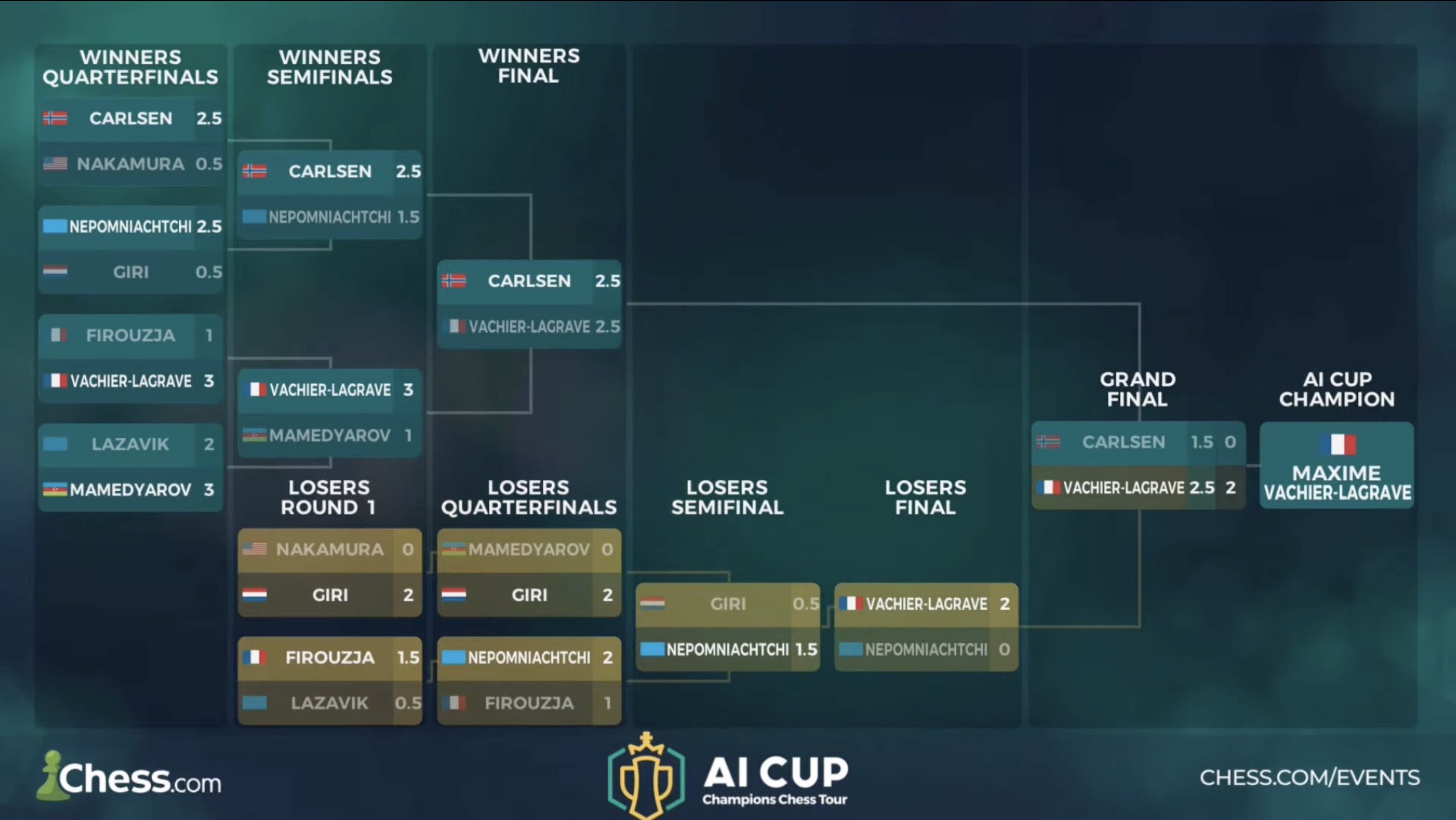
Division II
For one person to succeed others must fail, and it was tough on Fedoseev, who did his job by beating Artemiev for a second time in this event to win Division II. The match turned on a single win, which Fedoseev scored in the theoretically drawn but notoriously difficult to defend rook and bishop vs. rook endgame.
One careless check by Artemiev and it was over.
Fedoseev takes the lead in the Division II Grand Final by winning the theoretically drawn Rook + Bishop vs. Rook endgame against Artemiev! 112.Rh4+? was the losing move, and after 112...Kg3! there was no defense: https://t.co/vIrXWdtZkV #AICup #ChessChamps pic.twitter.com/YEssTobELd
— chess24.com (@chess24com) September 29, 2023
112...Kg3! attacked the rook on h4 and also threatened mate-in-1 by bringing the rook to the a1-square. Artemiev allowed checkmate on the board.
That looked likely to mean a dream day, and tournament, for Fedoseev.
Congratulations to Vladimir Fedoseev on winning Division II of the #AICup! That means:
— chess24.com (@chess24com) September 29, 2023
✅ He wins $10,000
✅ He picks up 50 #ChessChamps points
✅ Nepomniachtchi can no longer reach the Tour Finals in Toronto
❓ Fedoseev will play in Toronto UNLESS MVL beats Magnus! 🍿 pic.twitter.com/KS5U7dhHQU
In the end, however, Vachier-Lagrave denied Fedoseev a spot in Toronto.
Division II Bracket
Division III
Sevian, meanwhile, has carved out a niche for himself as the absolutely dominant force in Division III. He scored a third victory by "doing a Vachier-Lagrave" and coming from the Losers bracket to beat Mamedov twice on the same day and clinch the title.
Congratulations to @SamSevian on winning Division III of the #AICup, an amazing 3rd Division III victory in this #ChessChamps season! https://t.co/M5AveiMKiF pic.twitter.com/wYdSuW135q
— chess24.com (@chess24com) September 29, 2023
Division III Bracket
The Champions Chess Tour 2023 (CCT) is the biggest online tournament of the year. It is composed of six events that span the entire year and culminate in live in-person finals. With the best players in the world and a prize fund of $2,000,000, the CCT is Chess.com's most important event.
Previous Coverage
-
- Vachier-Lagrave Beats Nepomniachtchi To Set Up Rematch With Carlsen
- Carlsen Beats MVL In Armageddon After 'Great Day Of Chess'
- From Missing Mate To Swindling Stalemate, Carlsen Thwarts Challenger
- Carlsen Goes Undefeated vs. Nakamura, Advances To Winners Semifinals
- Mamedyarov Defeats Caruana 2-0, Joins Nakamura, Giri, Vachier-Lagrave In Division I
- Chess Marks A.I. Revolution With Launch Of AI Cup: Leg 6 Of $2m Champions Chess Tour



